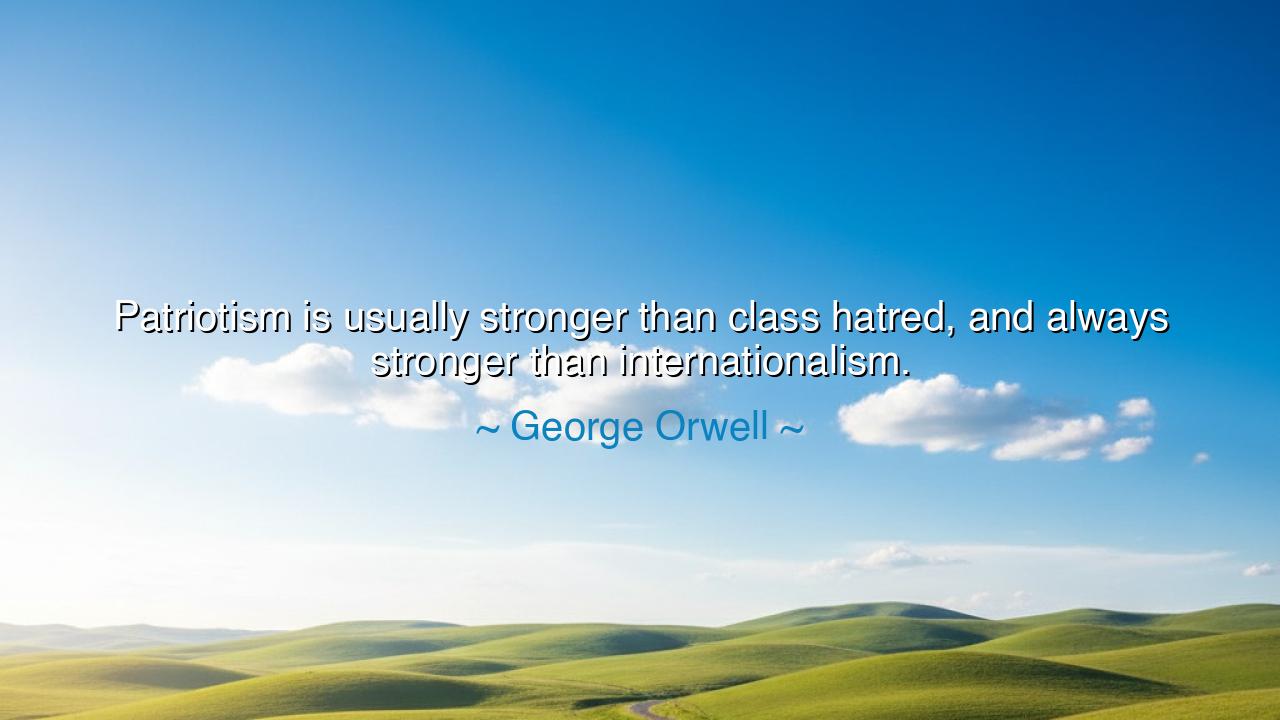
Patriotism is usually stronger than class hatred, and always
Patriotism is usually stronger than class hatred, and always stronger than internationalism.






Hearken, children of the future, and attend to the profound insight of George Orwell, who observed that “Patriotism is usually stronger than class hatred, and always stronger than internationalism.” In these words lies the enduring truth that the love of one’s country possesses a depth and resilience that transcends divisions of wealth, status, and ideology. Patriotism is a force that unites hearts across social chasms, binding citizen to citizen through a shared devotion to the land, its heritage, and its future. Orwell reminds us that while social grievances and global ideals may sway the mind, the allegiance to one’s homeland stirs the heart most powerfully.
The origin of this reflection emerges from Orwell’s own experience in the turbulence of the early twentieth century—a time when nations were riven by both internal class struggle and international conflict. In his writings, Orwell often grappled with the tension between social justice and national loyalty, recognizing that even amidst social inequality, the bond to one’s nation frequently outweighs the allure of abstract ideals or solidarity with distant peoples. Patriotism, he discerned, is a primal force, rooted in shared history, culture, and a sense of belonging that transcends the divisions of society.
Consider the historical example of the British people during World War II, when men and women from every station of life rallied together to defend their homeland from the shadow of tyranny. Aristocrats and laborers, clerks and farmers, set aside class resentments to participate in the common defense of the nation. Patriotism proved stronger than internal divisions, binding citizens in a shared struggle against a common threat, and exemplifying Orwell’s assertion that devotion to one’s country can override social discord and ideological differences.
Yet Orwell’s observation also carries a warning about the seductive power of internationalism, which, though noble in its aspiration, often fails to ignite the passions of the heart as vividly as patriotism. To many, abstract alliances, treaties, or global ideals inspire contemplation, but they do not summon the same visceral loyalty as the soil beneath one’s feet, the customs of one’s people, and the language, history, and values that constitute a homeland. The heart’s allegiance is drawn first to the immediate and tangible, not to the distant and theoretical.
In modern reflection, this wisdom underscores the necessity of balancing social conscience with civic loyalty. Recognize that while justice and equality are essential, the nation itself provides the framework within which such ideals can be realized. Orwell’s insight teaches that patriotism can serve as the glue that maintains social cohesion, even amidst disputes over class, wealth, or policy. Love of country unites, inspires courage, and provides the moral compass that guides collective action in moments of peril.
From this reflection flows a practical lesson: cultivate a sense of allegiance and responsibility to your country, even as you work to address internal inequalities. Recognize that class differences, though real and significant, are mitigated when citizens act in concert to uphold the nation’s freedom, security, and welfare. Engage in civic service, support community initiatives, and participate in the defense of shared ideals, for patriotism is the bond that empowers society to endure both internal tension and external threat.
Moreover, teach this principle to your peers and communities: honor the nation not as an abstract concept, but as a living entity sustained by the loyalty, effort, and ethical engagement of its citizens. Foster unity across social divides, celebrate shared history and values, and ensure that allegiance to the homeland inspires moral courage, service, and vigilance. In this way, patriotism becomes both a unifying force and a guiding light, directing citizens toward collective well-being.
Thus, children of tomorrow, inscribe upon your hearts this eternal truth: patriotism surpasses the petty enmities of class and the distant ideals of global allegiance. Let your devotion be active, expressed in service, courage, and loyalty. In loving your country, you build bridges over division, uphold justice, and ensure the continuity and strength of the nation across generations. George Orwell’s words remind us that true allegiance is not abstract, but rooted in the tangible, enduring love of the land and people who are your own.






AAdministratorAdministrator
Welcome, honored guests. Please leave a comment, we will respond soon